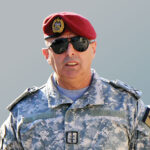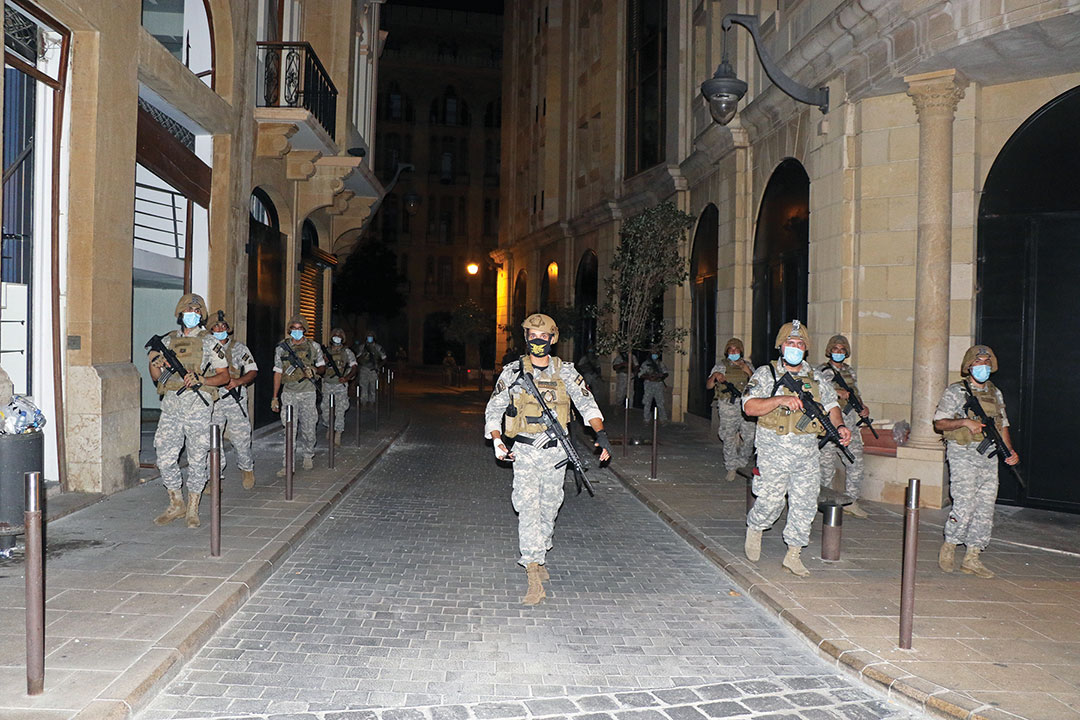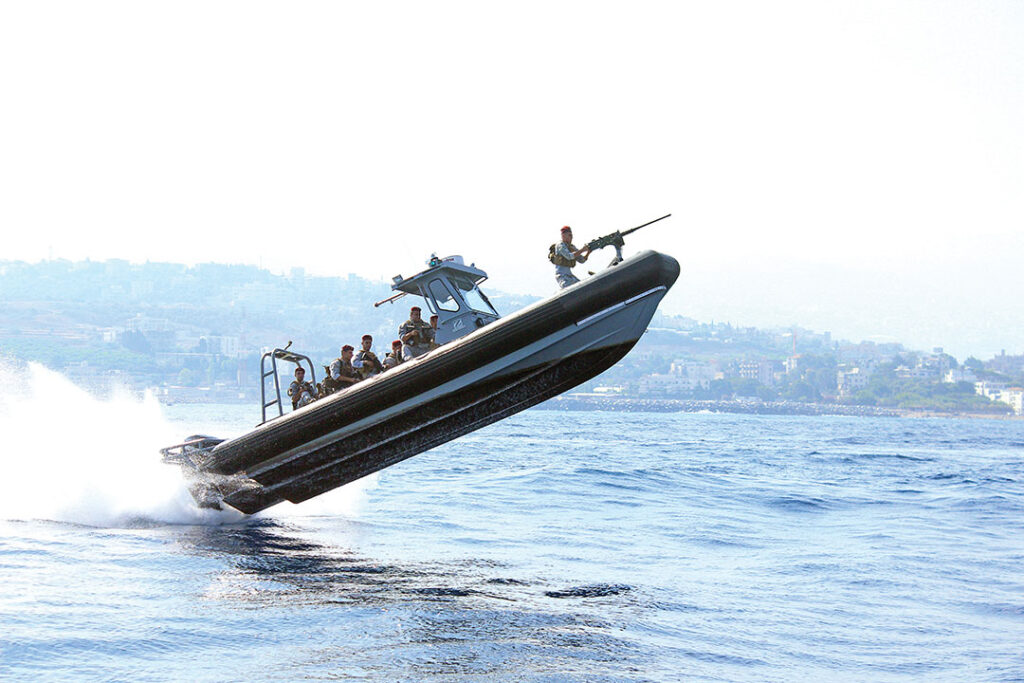Brig. Gen. Mohammed Al-Mustafa’s leadership of an elite Marine regiment has earned him international recognition
UNIPATH STAFF | Photos by Lebanese Armed Forces

All attempts by terrorist groups to fracture Lebanese national unity by plunging the Lebanese people into infighting have failed. Their attempts to undermine security and stability in the Nahr el-Bared refugee camp and in Tripoli and other northern cities ultimately disappointed. The will of the Lebanese people won out in the end. Behind such a victory lies a national force capable of fending off security threats, men and women who love their country and defend its sovereignty. These are the troops of the Lebanese Armed Forces. Among these heroes, the Marine Commando Regiment (Maghaweer al Baher) stands out, distinguished by its valor, performance, and willingness to sacrifice for the sake of Lebanon. They are led by a commander of determination and conviction, Brig. Gen. Mohammed Hussein Al-Mustafa.
His career explains the secret of his professionalism and dedication to serving the country and tells the story of a commando who has fought in many battles and earned the right to rise in the military ranks. He graduated from the Lebanese Army Military Academy in 1994 and progressed from platoon leader to company leader, then to branch chief before being named commander of the Marine Commando Regiment, one of the elite special forces regiments, in 2013.
“It was my dream to be a Soldier, to preserve national security and help my people through adversity,” Brig. Gen. Mustafa said.
The operational log confirms that the commando regiment led by Brig. Gen. Mustafa carried out nearly impossible tasks. One of the most noteworthy was the recovery of the remains of an Ethiopian Airlines passenger jet from the bottom of the sea. It had crashed in January 2010 minutes after taking off from Beirut, and Brig. Gen. Mustafa’s men had to contend with rough winter seas during more than 1,500 dives over two months.
“Despite working in extremely poor weather conditions, they were able to salvage the plane’s wreckage and recover both black boxes as well as all the remains of victims,” the general said. “Foreign teams involved in the search described what the regiment’s divers had done as ‘crazy.’ No diving accidents were recorded despite the large number of dives, abnormal weather conditions and poor visibility.”

Brig. Gen. Mustafa, who has degrees in military science from Lebanon and Jordan, has taken part in several regional and international courses for special operations and counterterrorism officers. He described the courses as important for refining his leadership skills, becoming well-rounded in military sciences and mastering diverse tactics.
“I’ve entered numerous training courses, including U.S. Navy Sea, Air and Land course, the SEAL course, and the SEAL instructor course, as well as the counterterrorism and lightning strike course in Egypt, and the 71st Battalion’s advanced antiterrorism and hostage rescue course in Jordan,” he said. “I also took part in a sniper and sniper instructor course, a reconnaissance course, and basic and advanced intelligence courses, in addition to the mountain combat course, advanced paratrooper course, air operations planning course, and several combat diving, deep water diving and diving medicine courses.”
Brig. Gen. Mustafa believes that continuous training and exercises based on scenarios derived from intelligence analysis are the keys to success for any force.
“The honorable results achieved in the North were not the result of the moment, but the result of reconnaissance, analysis, anticipation and planning for all possible scenarios, in parallel with constant training, which has increased the level of professionalism and improved the precision and discipline of the military,” he said. “We had been following suspicious activities and their developments through the regiment’s operations room, carefully analyzing their movements and planning for potential scenarios the enemy could have been plotting and how to counter them.”
Brig. Gen. Mustafa believes that building a cohesive military force is predicated on the commander’s ability to provide a harmonious environment, build team spirit among combatants, focus on managing fire during combat and strictly abide by the rules of engagement.
“During the Tripoli operation, battles were fought on more than one front. We forcefully repelled the terrorist groups that paralyzed the city and its surrounding areas in successive rounds of fighting. The officers, lower ranks and members of the regiment showed great courage, particularly upon the entry of the Mowlawi and Mansour [terrorist] groups to the security quadrant under heavy concentrated fire. Despite the circumstances, they completed the mission without being harmed or exposing citizens to harm. The regiment relied on a controlled fire tactic that requires not reacting indiscriminately to avoid collateral damage that usually accompanies military operations. We reacted only after identifying the sources of fire, responding relentlessly and with pinpoint accuracy.”

In an era of asymmetric warfare, internal security has become part of the mosaic of regional and international security. Terrorism cannot be defeated by an army alone, whatever its capabilities, but it must be combated by international partnerships in accordance with a philosophy that adopts the principles of international coalitions and joint forces. As such, Lebanon is eager to be an active member in this domain.
He lauds his Army’s evolving relationship with U.S. military partners, who have become the Lebanese military’s principal supporters in terms of equipment and training. A recent example is the bilateral Resolute Response 20 exercise.
“We are faced with the complex and dangerous security challenge of hybrid warfare, which employs and synchronizes all military, economic, information, diplomatic and political capabilities, forcing the international community to adopt the principle of partnerships to confront such wars,” he said. “We are therefore keen to participate in relevant Arab and international conferences such as the Counterterrorism Conference in Jordan, the Special Forces Exhibition and Conference in the United Arab Emirates and the meeting of the Global Coalition to Defeat ISIS in France, as well as the NESA [Near East South Asia] Conference and Naval Special Operations Conference in the United States, and the Middle East Amphibious Commanders Symposium with the Marines. We look forward to further engagements that will sharpen our combat skills and bring us closer to friends and brothers and more open to sharing experiences.”
His commitment to duty and the Soldier’s code has garnered him the respect and appreciation of the leadership. In addition to receiving the French National Defense Medal, he has collected more than 30 commendations from the top leadership of the Lebanese Army.
But he refuses to rest on those laurels. One of Brig. Gen. Mustafa’s goals is to diversify skills, training and joint exercises to build a high capacity force capable of immediate response to security crises. The regiment carried out exercises with the French and Brazilian navies and the United Nations Interim Force in Lebanon (UNIFIL) and participated in the Eager Lion exercise in Jordan and the Eagle Resolve exercise near Doha.
“Capacity building requires continuous training and exercises not only by Lebanese trainers but also by foreign experts [U.S., British, French, Italian and Brazilian training teams]. The desire to reach the highest levels has paid off, as all successive teams working with the regiment have praised the competence of the trainees.”

